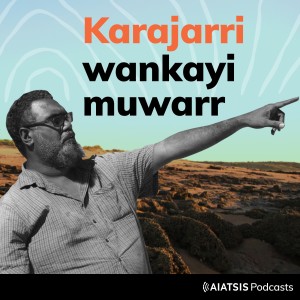Karajarri wankayi muwarr
This podcast series follows the story of the Karajarri people of the Kimberley region in Western Australia as they reconnect with cultural heritage material in the AIATSIS Collection. Archival recordings of senior people have been essential to strengthening culture and has allowed Karajarri people to close a forty-year gap between the oldest and youngest performers of Karajarri cultural practices. This is a story about resilience and cultural resurgence. The podcast series Karajarri wankay muwarr (‘keeping Karajarri language and stories alive’) is part of the AIATSIS research project Preserve, Strengthen and Renew in community.
Episodes

Thursday May 26, 2022
Thursday May 26, 2022
Karajarri Elder Mervyn Mulardy and his grandson Wynston Shovellor tell us the incredible story of the Karajarri people, whose traditional lands and waters stretch over several hundred kilometres in Western Australia’s Kimberley region.
We learn about Bidyadanga, the largest remote Aboriginal community in Western Australia, the impact of colonisation in the Kimberley and on Karajarri, and the long journey that Karajarri have undertaken to have their native title recognised. The successful recognition of native title has been a cause for celebration, but has also been fraught with its own challenges.

Thursday May 26, 2022
Thursday May 26, 2022
With their native title recognised, the Karajarri were able to turn more of their attention to managing and caring for Country. The Karajarri have now established a Prescribed Body Corporate, the Karajarri Traditional Lands Association (KTLA), and since 2014 have negotiated an Indigenous Protected Area (IPA) with the Australian government. The Karajarri Healthy Country Plan was developed to outline aspirations for Country and culture, and guide how Karajarri lands are managed.
Karajarri culture is foundational to all these activities. As part of managing Country, the Karajarri have developed a database that includes cultural information about Country, as well as old song recordings and other cultural materials. With help from AIATSIS, the Karajarri were able to gain access to old archival recordings, and were able to go out on Country and record new cultural information.

Thursday May 26, 2022
Thursday May 26, 2022
Archival recordings of old senior people have been essential to strengthening Karajarri culture. But the emotions they elicit in Mervyn are not straightforward. Although many of those who recorded Karajarri were not appropriately respectful to the senior people they spoke to, Mervyn is ultimately glad that the recordings exist because they have been instrumental for cultural revitalisation.
In this episode, we discuss and hear excerpts from multiple archival recordings, including those from Father Kevin McKelson, Geoffrey O’Grady, Edward Johnson and John Howard.

Thursday May 26, 2022
Thursday May 26, 2022
With the assistance of old archival recordings, cultural revitalisation and strengthening is well underway for the Karajarri. Mervyn describes his process for learning from old songs and bringing them back into usage. He also talks about plans for establishing a cultural arm of the Karajarri Traditional Lands Association to ensure that all of the organisation’s other activities are driven and supported by culture, which remains central to the aspirations of the Karajarri people.



